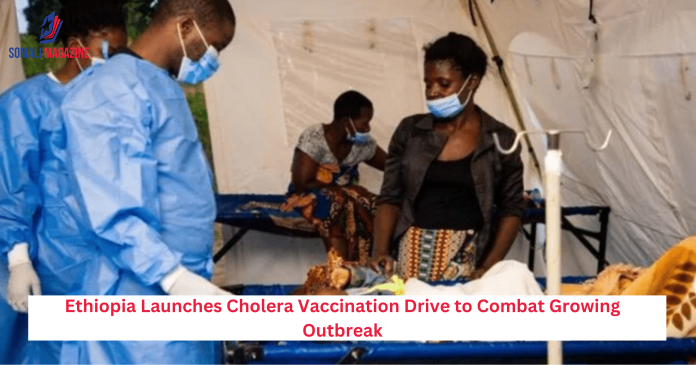Facebook Twitter (X) Instagram Somali Magazine - People's Magazine
The Ethiopian government has launched a major cholera vaccination campaign in the southwestern part of the country, aiming to protect around one million people who are at risk.
In a statement on Sunday, Ethiopia’s Ministry of Health announced that the vaccination drive will cover all zones of the Gambella Region, including refugee camps. The campaign is set to take place over the next week.
This effort comes as the World Health Organization (WHO) and various humanitarian agencies have raised concerns about the rapid spread of cholera in Gambella, which shares a border with South Sudan. These organizations are calling for urgent action to control the outbreak.
Ethiopian Minister of Health Mekdes Daba, speaking at the launch event, emphasized the importance of not just vaccinations but also maintaining good hygiene and sanitation to prevent further outbreaks. She stressed that improving personal and environmental cleanliness is a key preventive measure against cholera.
Meanwhile, the international medical charity Médecins Sans Frontières (MSF) has issued a warning about the worsening humanitarian situation along the South Sudan-Ethiopia border. The region is facing a crisis due to increasing violence, mass displacement, and a growing cholera outbreak, all of which are pushing communities to the brink.
South Sudan has been struggling with cholera outbreaks since last year. According to MSF, the latest outbreak, which began in Upper Nile State, is now spreading to other parts of South Sudan and crossing into Ethiopia’s Gambella Region. The WHO has also expressed concern, stating that the disease was first identified in Gambella’s Akobo District early last month but has since spread to eight districts and four refugee camps.
Humanitarian organizations are urgently calling for support to health facilities and for the provision of clean water. The lack of safe drinking water and poor sanitation are making the outbreak worse. The situation is further complicated by ongoing clashes between government forces and armed groups in South Sudan’s Upper Nile State, which are forcing more people to flee into Ethiopia. Many of these refugees, along with injured people, are seeking shelter in Gambella, adding to the existing public health challenges.
To combat the spread of cholera, authorities and aid groups are focusing on a combination of measures. In addition to the mass vaccination campaign, efforts are being made to improve access to clean water, enhance sanitation facilities, and educate communities about hygiene practices.
The Ethiopian government, along with international health organizations, is working to ensure that vaccines reach the most vulnerable populations, especially those in refugee camps and remote areas. However, the success of the campaign depends on continued support from global humanitarian agencies, as well as increased funding and resources to strengthen healthcare services in affected areas.
The situation remains critical, and without immediate intervention, the cholera outbreak could continue to spread, putting more lives at risk. Health officials are urging people in the affected regions to follow proper hygiene measures, such as washing hands with soap and drinking only clean water, to help prevent further infections.
As efforts continue to contain the outbreak, authorities are also monitoring the movement of people between South Sudan and Ethiopia, recognizing that cross-border migration plays a significant role in the spread of the disease. Ensuring that incoming refugees receive vaccinations and medical care will be crucial in controlling the epidemic.
In conclusion, Ethiopia’s cholera vaccination campaign is a vital step in fighting the outbreak in the Gambella Region. However, alongside vaccinations, improving hygiene, sanitation, and access to safe drinking water will be essential in preventing further infections. Humanitarian organizations are calling for urgent international assistance to support health workers, provide clean water, and strengthen the healthcare system in the affected areas. Without swift and coordinated action, the situation could worsen, endangering even more lives in both Ethiopia and South Sudan.

